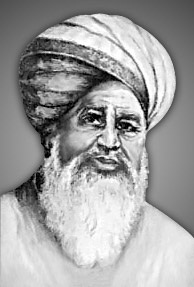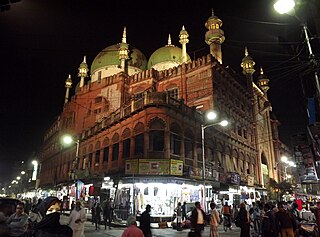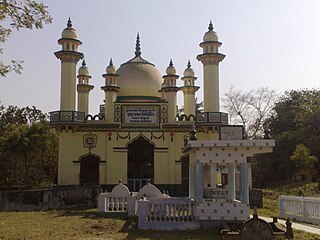
The National Awami Party (NAP), translated from Urdu to English as National People's Party, was the major left-wing political party in East and West Pakistan. It was founded in 1957 in Dhaka, erstwhile East Pakistan, by Abdul Hamid Khan Bhashani and Yar Mohammad Khan, through the merger of various leftist and progressive political groups in Pakistan. Commonly known as the NAP, it was a major opposition party to Pakistani military regimes for much of the late 1950s and mid-1960s. In 1967, the party split into two factions.
Zaidpur is a town and a nagar panchayat in Barabanki district, Uttar Pradesh, India.

Maulana Azad College is a government college of liberal arts, commerce and science in India, located in central Kolkata, West Bengal, India. The college is fully government-administered. It is located near the junction of Rafi Ahmed Kidwai Road and S. N. Banerjee Road, popularly called "Lotus crossing".

Hussain Ahmad Madani was an Indian Islamic scholar, serving as the principal of Darul Uloom Deoband. He was among the first recipients of the civilian honour of Padma Bhushan in 1954.

Hakeem Noor-ud-Din was a close companion of Mirza Ghulam Ahmad, the founder of the Ahmadiyya Movement, and his first successor and first Ahmadiyya caliph since 27 May 1908.

Haji Shariatullah was a prominent religious leader and Islamic scholar from Bengal in the eastern subcontinent, who is best known as the founder of the Faraizi movement. In 1884, the Shariatpur District was formed and named after him.

The Maulana Abul Kalam Azad Institute of Asian Studies is an autonomous research institute based in Kolkata. It is funded by the Ministry of Culture of the Government of India. It was founded on 4 January 1993. The foundation stone of the institute was laid where the new building now stands on 12 March 1993. It is devoted to the study of the life and works of Maulana Abul Kalam Azad, the eminent nationalist leader and India's first education minister, after whom it is named, and to the furtherance of Area Studies, with special reference to South Asia, Central Asia and West Asia, especially dealing with social, cultural, economic, political and administrative developments in Asia from the nineteenth century to the present. M.Phil.- and Ph.D.-level students of the University of Calcutta, Jadavpur University and Jawaharlal Nehru University, New Delhi are also associated with it.
Haji Muhammad Abdul Wahhab (Urdu: حاجی راو محمد عبد الوہاب, Ḥājī Muḥammad ‘Abdul-Wahhāb was an Islamic preacher and the emir of Tablighi Jamaat in Pakistan.

Rajabazar is a locality situated in the city of Kolkata, West Bengal, India. Geographically, it lies between CIT Road and APC Road, with the neighborhood developing around Narkeldanga Main Road, now renamed Maulana Abul Kalam Azad Sarani, which connects CIT Road and APC Road. Consequently, Rajabazar is positioned between Maniktala, Narkeldanga, and Sealdah.

Waris Ali Shah (1817–1905) was a Sufi saint from Dewa, Barabanki, India, and the founder of the Warsi Sufi order. He traveled to many places specially Europe and the west and admitted people to his spiritual order. He belongs to the 26th generation of Hazrat Imam Hussain رضی اللہ عنہ His shrine is at Dewa, India.

The Nakhoda Musjid is the principal mosque of Kolkata, India, in the Chitpur area of the Burrabazar business district in Central Kolkata, at the intersection of Zakaria Street and Rabindra Sarani.
Al-Jame-atul Islamia is an Islamic seminary of Sunni-Barelvi Muslims in India. It is located in Raunahi, Ayodhya District, near Lucknow, in the north Indian state of Uttar Pradesh in India.
Mahamaya Rajkiya Allopathic Medical College or Mahamaya Government Allopathic Medical College, generally known as Mahamaya Medical College, is one of the state run medical colleges with multispeciality hospitals in Akbarpur, Ambedkar Nagar. The institution, as a mega project, was built within the constituency of Chief Minister of Uttar Pradesh, Mayawati, at an expenditure of more than ₹400 crore. This institute has been established under the special component action plan.
Mahmood Hasan Gangohi was an Indian mufti, Islamic scholar and former Grand Mufti of Darul Uloom Deoband and Mazahir Uloom, Saharanpur. He was the most senior disciple of Muhammad Zakariyya al-Kandhlawi.

Garden Reach is a neighbourhood of Kolkata in West Bengal, India. It is situated in the south-western part of Kolkata on the eastern banks of the Hooghly River. Localities within Garden Reach include Metiabruz, BNR Colony, Bandhabartala, Bartala, Badartala, Rajabagan and Santoshpur.

Anandapur is a neighbourhood of East Kolkata in the Indian state of West Bengal.
Maulana Nazar-ur-Rehman (مولانا نذر الرحمن) is an Islamic preacher and the current Ameer (Head) of Tablighi Jamaat in Pakistan. Maulana Haji Nazur Rahman, the new leader of Tablighi Jamaat, is from village "Bilawal" of Tehsil and District Rawalpindi. This village is located on the other side of the river Swan, 10 kilometers west of Chakri from Rawalpindi. Before Pakistan Tehsil Fateh Jang was included in Campbellpur district, Maulana Nazur Rahman was born in 1929 in the house of late Hafiz Ghulam Mohiuddin, Hafiz Ghulam Mohiuddin was a pious person and one of the devotees of Hazrat Pir Meher Ali Shah. He used to go to Golra Sharif on foot to meet Pir Saheb due to limited access. The three sons of Hafiz Ghulam Mohiuddin, Haji Hafiz Fazl Hussain, Hafiz Muhammad Siddique alias Muhammad Ji and Maulana Nazarur Rahman were identified as Bamsami.

Maulana Abdul Majeed Ludhianvi was a Pakistani Islamic scholar and writer who served as 7th Emir of Aalmi Majlis Tahaffuz Khatm-e-Nubuwwat and a senior member of the executive committee of Wifaq ul Madaris Al-Arabia, Pakistan

Moḥammad Abū Bakr Ṣiddīque was a Bengali Islamic scholar and the inaugural Pir of Furfura Sharif in West Bengal. He is regarded by his followers, who are scattered across eastern India and Bangladesh, as a mujaddid (reviver) of Islam in the region, due to his significant contributions in religious propagation via the establishment of mosques and madrasas, publication of newspapers and education development in neglected areas. He was the founding president of the sociopolitical Anjuman-i-Wazin-i-Bangla organisation, which advocated for causes such as the Khilafat Movement and Pakistan Movement. Siddique died in 1943, and his shrine is greatly venerated as one of West Bengal's most prominent Sufi centres.













